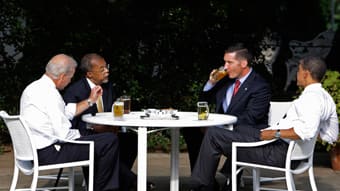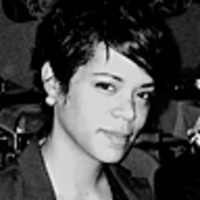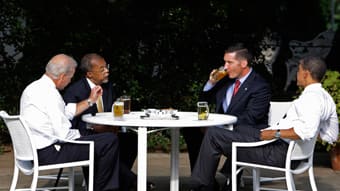
In a world in which the conversation on race has traditionally taken a back seat to both logic and reason, it’s no wonder that yesterday’s so-called “Beer Summit” at the White House seemed to make little sense at all. It wasn’t because the president was wrong in offering up a few cold ones to my father, Henry Louis Gates, and the now infamous Sgt. James Crowley in an attempt to tame the media blitz around my father’s arrest—it was because like most issues that make their way to TMZ, the reference point had shifted. The debate over Red Stripe and Blue Moon had somehow overshadowed the fact that this story began with a black Harvard professor and a white cop from Natick, Mass.—and as CNN’s countdown clock to the event taunted viewers like a time bomb, it was clear that this day wasn’t going to be the beginning of a serious discussion on human relations but rather a circus-like ending of a misunderstanding between a couple of very decent men.
I can’t say that I was shocked.
My father cut right through the thick tension of hurried salutations and offered the Sgt. his hand and joked, “You looked bigger the last time I saw you.”
As our family rounded the corner to the White House library and I first caught sight of Sgt. Crowley’s lovely daughter; she was wearing an appropriately heavy and charmingly untrained amount of green eyeliner on her lower lashes, and I saw my former self in her. We were instantly transported from the post-racial myth of America in 2008 to the reality of 2009. There they stood, a pleasant family of five, listening patiently to the overzealous tour guide boast about the fully functioning fireplace to the left of the doorframe.
As soon as my father’s foot crossed the threshold of the room, the storm of mediators immediately rushed to introduce us, but true to form, my father cut right through the thick tension of hurried salutations and offered the Sergeant his hand and joked, “You looked bigger the last time I saw you.” Crowley’s cheeks flushed red as a smile dashed across his lips, and his young son, whose cheeks had long since flushed the same muted crimson, looked up at his father and smiled. This wasn’t a family raised on hate. At that moment, right there in the library, they were just like us: a young family groomed to perfection, waiting to learn how to get those damn cameramen off their lawn and to put this sensationalized hell behind them. “I read an article where they called my father, ‘sexy cop.’ It was embarrassing,” his daughter said as we sat down for cookies and Coke. “Yeah,” I replied. He’s pretty cute.” We laughed, as Crowley’s wife rubbed her daughter’s back and reminded her son to mind the gift they had brought for the president. It was a grey Boston jersey, a fitting gift from a young boy to our commander-in-chief.
Moments later, the Sgt. and my father were escorted to the Rose Garden where the press sat waiting “at least 40 feet away” while the rest of us continued on with our tour. As we walked by a set of French doors that gave a clear view of this highly anticipated talk, I saw Mr. Obama’s lean body coolly draped over a lawn chair I wondered what these four men—President Obama, Vice President Biden, Sergeant Crowley and my father—could possibly say to heal this situation and what the press was actually waiting for. Would my father and Sergeant Crowley be reduced to who they were on that fateful day in my father’s house on Ware Street and give us all a glimpse of what really happened? Or could it be that this small collection of men were actually devising some master plan to rid the world of all racist tendencies right there in the presidential Rose Garden over a few brewskis? No. That would have been impossible to achieve—even on Obama’s best day and even if my father had actually finished his Sam Adams.
The vice president made a swift exit, saying that he would have worked late that night but instead had to rush home to Delaware to tend to his wife who had dislocated her shoulder. And as his car swooped away, another came in its place to carry us back to Dulles International Airport, where we snaked our way to Gate B—now devoid of photographers, news reporters and the invasive camera crews. I asked my father what the President had said during their chat and as he slipped off his shoes and reclined his chair, he said: “The president and the vice president are great men, Liza. They did the right thing to invite us there to talk, but it's up to us now to extend this conversation. We have plans to meet in private and discuss things. You know, Crowley’s not a bad guy. He’s not a Joe the Plumber who wants to represent the Right. He would be horrified to be considered a racist.”
Discrimination is the single greatest wound in American history and could never be solved over a beer. Not today, not tomorrow, not ever. There are more black men in prison than in college and literally thousands of black men are arrested across this country each day. And while I might agree with the president’s initial statement that the “Cambridge Police Department acted stupidly,” my father is not the first nor will he be the last black man to be arrested for no reason—in his own home or elsewhere—and Sergeant Crowley isn’t the first officer to fudge a police report. They are simply pawns in the rebirth of unfashionable intolerance in a world that likes to think our dashing brown-skinned 44th president has emerged to make nice with the past, present, and future. It’s an impossible task for the president and speaks more to our nation’s vulnerable value system than the unfortunately common situation my father and the Cambridge police found themselves embroiled in. As my father said on the plane yesterday morning on our way to the White House, “there are approximately 800,000 black men in prison and on July 16, 2009, I simply became one of them.”
Elizabeth Gates is a graduate of The New School University, where she cultivated her love for fashion and writing.

